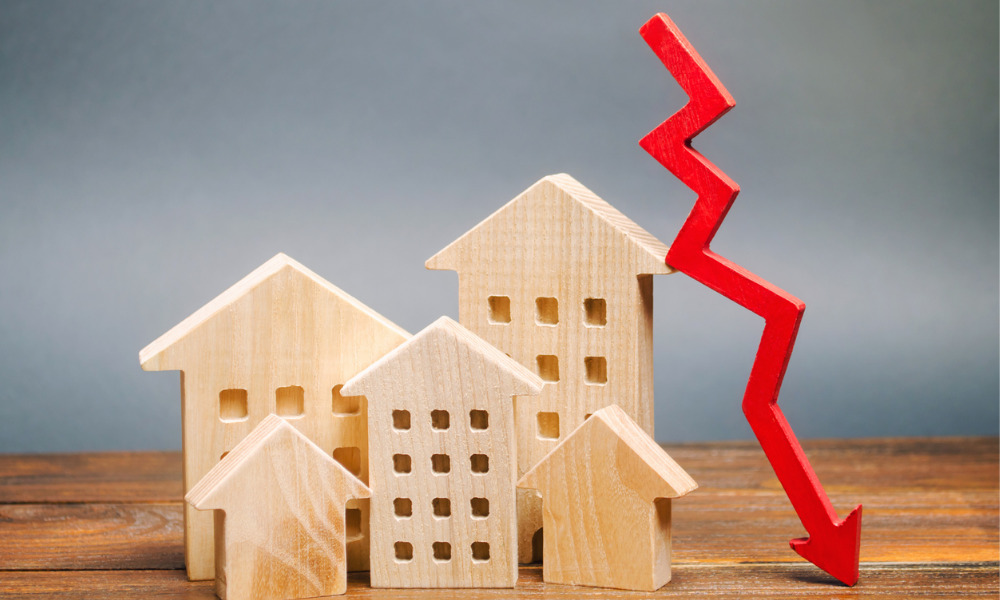But many buyers remain locked out due to the same forces pushing prices down

New Zealand has seen the biggest quarterly drop in house prices in a decade, raising some hopes of a cooling market for those who have long been locked out by sky-high property prices. But rising interest rates, higher cost of living, and inflation – the same forces that are pushing prices down – are also hitting prospective buyers, especially those on lower incomes.
Read more: House prices hit record high – but there’s a catch
Price data from across the country is now showing some of the largest drops and slowdowns after years of steeply rising prices and the aftermath of the global financial crisis. Valuation company QV found a -0.6% dip in the average home value nationally in the first quarter of the year, to $1,046,636. Following this small decrease came a dramatic shift in the mood among buyers, ANZ economists said – from “fear of missing out” to “I’m not paying that.”
“With the massive rise in listings over the past couple of months the balance of power has shifted firmly into the hands of buyers, after such a prolonged period of it being a sellers’ market,” QV General Manager David Nagel told The Guardian.
ANZ economists are now predicting a 10% dip in prices over the year. But while that would easily be the biggest drop in prices in the last decade, even that won’t return prices to those of two years ago – median house prices rose 31% in the year to July 2021.
The biggest drops were posted in the country’s main centres, which Nagel said were “currently taking the brunt of the impact of rising interest rates, high living costs, and tightening bank credit.” In February, the Real Estate Institute reported a nearly 20% drop in Auckland median house prices since their peak in November, from $1.54 million in November to $1.25 million in February.
But while those shifts may appear as good news for prospective homeowners, the same forces that are pushing prices down – rising interest rates, higher cost of living, and tougher lending rules – are also keenly felt by first-home buyers, especially those at the bottom end of the market.
In 2021, after years of rocketing prices, many hopeful home buyers were desperate to get onto the property ladder, in case it continued to rise and the bottom rung of the ladder rose out of their reach.
Read next: House prices up – how will brokers serve first-home buyers?
“There were a lot of people who had this fear of missing out… a lot of people were really trying to get in, to stretch and to make it work,” Gemma Rasmussen of Consumer NZ told The Guardian.
But now with predictions of rising interest rates and dropping prices, buyers have become concerned about stretching beyond their means.
“We’re now at a point where people have the fear of paying too much money,” Rasmussen told the publication. “There’s a fear around interest rates going up and that starts making people a lot more cagey around purchasing. Compare that sentiment [with] three or four months ago – it was completely different.”
Just 16% of Kiwis thought it was a “good time to buy” in February, down from 25% in October, according to a Consumer NZ survey. Conversely, 58% thought it was a bad time to buy, up eight percentage points. An increasing number of Kiwis believed homes would drop in value over the next year, and fewer thought values would increase. Some 83% overall thought the housing market was still either “overinflated” or “out of control.”
Driving the growing hesitancy for buyers is a mixture of factors, including sweeping housing legislation last year that aimed to cool the market. Reforms included tougher lending rules for banks, which saw many mortgage applicants turned down for too much “discretionary spending,” and phasing out mortgage interest as a tax-deductible cost. There is also the record-high inflation and increasing anxiety over the cost of living currently being experienced in New Zealand. High inflation rates mean banks projecting further increases in mortgage interest rates – which could push the already struggling home loan borrowers over the edge.
“For the people who have overextended, there could be a degree of nervousness for them about now sitting with a really high mortgage and having these high cost of living costs, also knowing that they may not be able to go on and make the sale,” Rasmussen told The Guardian. “Six months ago, the primary concerns for the nation, [were] around COVID-19, and in particular concern about an overinflated housing market. Now the top concern for New Zealanders is around just purely the financial cost of living. People are really finding that to be a massive strain.”



